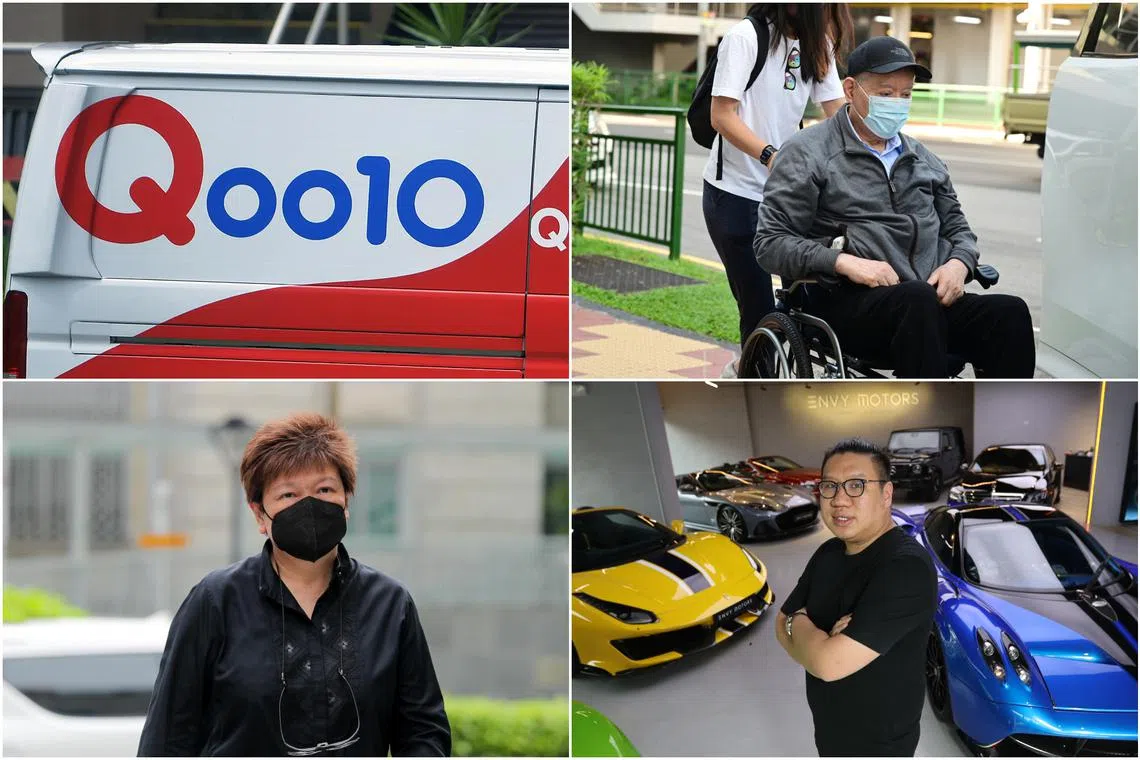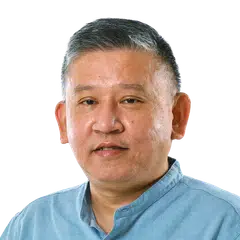2024 wrapped: From Qoo10 to O.K. Lim, fallout continues from industry giants’ house of cards
Sign up now: Get ST's newsletters delivered to your inbox

ST looks at some once high-flying companies and executives who are still facing court battles.
PHOTOS: ST FILE, LIANHE ZAOBAO FILE
SINGAPORE – On Nov 11, online marketplace Qoo10 was declared insolvent
Other than Qoo10, the fallout from some once high-flying companies that failed in the past few years – namely Hin Leong, the Envy group of companies and Hyflux – is still making its way through various courts in 2024 and 2025.
Qoo10 liquidators working on winding-up plan
Singapore-based Qoo10 was founded in 2010 by South Korean national Ku Young-bae.
Qoo10’s problems first surfaced in July in South Korea, when two of the online shopping platforms that it owns – WeMakePrice and Tmon – failed to pay money owed to sellers in May. Traders left the platforms and complaints piled up. The South Korean authorities launched an investigation into both platforms.

Online marketplace Qoo10 was declared insolvent by the Singapore High Court on Nov 11 and ordered to be wound up.
PHOTO: ST FILE
In Singapore, merchants also faced delayed payments
The company has reportedly retrenched more than 90 of its 110 employees here since mid-August due to cash flow problems.
In September, MAS directed Qoo10 to suspend all payment services
Meanwhile, on Sept 10, Qoo10 creditor Korea Culture Promotion (KCP), which operates culture portal sites and issues culture gift certificates in South Korea, applied to the Singapore High Court for Qoo10 to be liquidated over nearly 76 billion won (S$71 million) in unpaid debt.
Six local creditors to which Qoo10 owed about $3.77 million in total supported KCP’s court application.
After hearing arguments on Nov 11, Justice Aidan Xu ordered Qoo10 to be wound up. The court also appointed Mr Abuthahir Abdul Gafoor and Ms Yessica Budiman of AAG Corporate Advisory as liquidators.
Ms Budiman told The Straits Times that the liquidators are working to establish a clear plan for the liquidation.
“Creditors have been approaching us on a daily basis with inquiries about their claims,” she said. “We have also been reaching out to those creditors who may have information about the company’s past affairs.”
She added: “We anticipate convening a creditors’ meeting once we have gathered sufficient information to provide an update.”
In 2025, the state of Qoo10’s financial affairs is expected to come to light as the liquidation process unfolds.
But that will not be the last of Qoo10’s woes. The South Korean authorities are investigating Qoo10, its founder and chief executive Ku, and platforms Tmon and WeMakePrice for misuse of funds, fraud and embezzlement.
Fallen oil tycoon O.K. Lim convicted, family applies for bankruptcy
Four years after the 2020 collapse of oil trading giant Hin Leong
On Nov 18, Lim was sentenced to 17 years and six months’ jail

Hin Leong founder O.K. Lim was sentenced to 17 years and six months’ jail on two cheating charges and one count of instigating forgery on Nov 18.
PHOTO: ST FILE
Lim was found to have duped HSBC into disbursing US$111.6 million (S$151 million) to Hin Leong based on two fabricated oil sale contracts. He also instructed a former employee to forge documents for one of the bogus contracts.
Lim is appealing against both the conviction and jail term.
Earlier, the civil lawsuits brought by Hin Leong’s liquidators and its biggest creditor HSBC against Lim and his children also came to an unexpected end in September.
After a 50-day civil trial of both cases, the Lim family agreed to pay US$5.3 billion
Hin Leong collapsed in 2020 amid the Covid-19 pandemic and an international oil price rout. It ran out of cash when its credit lines were withdrawn, and it had not hedged against the falling oil prices. The company, its shipping arm Ocean Tankers and sister firm Xihe Holdings were placed under judicial management and subsequently liquidated.
In May 2021, Hin Leong’s liquidators obtained a High Court order to freeze the assets worldwide
In 2025, the bankruptcy proceedings of the Lims are expected to play out in court. The court is expected to appoint a bankruptcy trustee to investigate whether there are assets in addition to those that have been frozen that can be used to pay the creditors.
Liquidators seeking to recover $855m from players in Envy Ponzi scheme
The high-profile criminal trial of businessman Ng Yu Zhi
The 37-year-old is accused of masterminding a billion-dollar fraudulent nickel investment scheme

Businessman Ng Yu Zhi, the alleged mastermind of a nickel investment scam, spent more than $21 million on about 20 luxury cars between December 2019 and February 2021.
PHOTO: LIANHE ZAOBAO FILE
Ng, who faces a total of 42 criminal charges, was declared bankrupt
He was also sued in 2021 by the liquidators of the Envy companies, who are seeking to recover about $855 million from him, former directors Lee Si Ye and Ju Xiao, and former employee Cheong Ming Feng.
The four defendants are alleged to have run the biggest Ponzi scheme in Singapore’s history.
The liquidators’ application was heard in the High Court in July and August 2024, and proceedings are ongoing. The parties and their solicitors are due back in court in early 2025 for closing arguments, with a decision expected later in the year.
The liquidators are represented by a legal team from Shook Lin & Bok.
In February 2024, the legal team led by Shook Lin & Bok partner David Chan won a major legal victory at the High Court against investor CH Biovest. The team successfully persuaded the High Court to claw back $2.3 million received by CH Biovest from Envy Asset Management.
CH Biovest, a wholly owned subsidiary of mainboard-listed Chuan Hup, had invested $5.5 million with Envy Asset Management in February 2020 and received $7.8 million in return some eight months later, chalking up a profit of $2.3 million.
The company had argued that it was a bona fide investor that believed Envy Asset Management was conducting a legitimate business.
However, Justice Goh Yihan said the amount was paid with the intent to defraud Envy Asset Management’s investors in the Ponzi scheme. CH Biovest thus had to refund the so-called investment return of $2.3 million, as no actual nickel trading had taken place.
The High Court decision, which was upheld by the Court of Appeal in October 2024, is significant in that it opens the door for the liquidators to claw back the profits that other investors have withdrawn from their investments with Envy Asset Management.
While the outcomes of Ng’s criminal trial and the liquidators’ bid to recover monies from Ng and the trio of former Envy directors and staff member may become clearer in 2025, the liquidation process may well extend beyond the year before the investors can recover some of their monies, if at all.
Troubled waters stir for Hyflux in 2025
It may have been more than six years since the Hyflux crisis started in May 2018, but the drama continues to play out in Singapore courts in 2024.
In March 2011, the water treatment giant won a tender to build Singapore’s second desalination plant in Tuas. It said it would build its own power plant to generate power for the desalination process and sell excess power to the grid.

Former Hyflux CEO Olivia Lum Ooi Lin leaving the State Courts in November 2022.
PHOTO: ST FILE
The desalination plant officially opened in September 2013 and Hyflux began selling electricity to the grid in February 2016, but there was an oversupply in the electricity generation market and Hyflux suffered losses.
In May 2018, Hyflux filed for bankruptcy protection. In July 2021, the troubled company was liquidated
After Hyflux was wound up, two civil lawsuits commenced in the High Court in 2022.
In the first lawsuit, Hyflux, its two subsidiaries Hydrochem (S) and Tuaspring, and liquidator Cosimo Borrelli are seeking to recover from Hyflux’s founder and former chief executive Olivia Lum Ooi Lin at least $690.6 million in claims over her alleged breach of fiduciary duty.
In the second lawsuit, Hyflux, Hydrochem (S) and Tuaspring are seeking to recover over $684.6 million from KPMG. They alleged that KPMG had breached its duty to exercise reasonable skill and care in carrying out its audit work in relation to its audit of Hyflux’s financial statements from 2011 to 2017.
In March 2024, the High Court granted Lum’s application
While the civil lawsuits’ timeline is unclear, Lum’s criminal trial is scheduled for the second half of 2025, The Straits Times understands.
She was first charged in November 2022 with three counts of violations of the Securities and Futures Act and the Companies Act. Three fresh charges for violations of the Companies Act were added in May 2023.
Public interest in the trial, when it happens, is expected to be high. In Hyflux’s heyday, the company was a favourite among the investing public. At its peak, the stock traded for more than $3, but had plunged to 21 cents by the time trading of Hyflux shares and securities was suspended in May 2018.
Toh Yong Chuan is The Straits Times’ assistant business editor, covering manpower, political and policy issues, and law. He is an advocate and solicitor of the Supreme Court.



